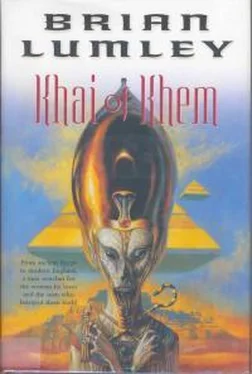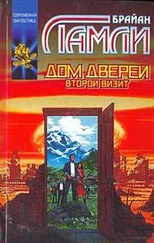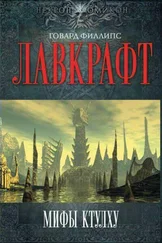“We have spoken.”
For a long moment, there was silence. Then the chief Genduhr Shebbithon said: “How may we know that any of this will come to pass? Give us a sign.”
“A sign?” the keen-eyed brown mage from Daraaf stood up. He was the Mage of Oneiromancy, an interpreter of dreams, and now his eyes were bright with sights unseen by the others. “Last night, I dreamed a rider would come from the Gilf Kebir,” he said. “And the rider would say that word was come out of Khem of the gathering of Pharaoh’s forces, that even now a great army marched on Kush.”
“Oh?” said Genduhr Shebbithon uncertainly, “and where is this messenger?”
The brown mage gazed at him and smiled until his keen eyes twinkled like stars. “That is your sign, chief,” he said, “for you spoke those very words in my dream last night. And I answered thus: ‘Let the messenger speak for himself!’”
“Majesty!” an usher burst in through the great doors. “A rider has come from the east with a message.”
Ashtarta smiled grimly at the suddenly wide eyes and stricken looks on the faces of her chiefs. “Send him in,” she commanded. “We know what his message will be—but I should like certain of my chiefs to hear it for themselves. …”
It took all of five days for Ashtarta’s message to get out to the tribes, but after that, her instructions were followed to the letter. All goods and chattels were bundled up for the journey or else hidden away in inaccessible places; beasts were either herded together ready for the drive out of Kush, or slaughtered where they stood; and as the first cohorts of Khem arrived at the foot of the Gilf Kebir, so the tribes of Kush departed, as it were, “by the back door.”
After twelve weeks, when Pharaoh’s forces encircled the Gilf’s plateau-lands and got behind those frowning cliffs of near-impregnable rock, then it was discovered how sorely the departed Kushites had dealt with the land; when all about was seen the scorched earth and blackened houses, the choked wells and dams broken down so that streams ran to waste, the ravaged fields and stripped orchards. And when finally it dawned on the commanders of that expeditionary force that indeed the Kushites were fled, then they set up their camps, took stock of their meager supplies and sent word back to halt the advance of an even greater army which was clearly unnecessary and unsup-portable.
At first Pharaoh greeted this news with a mad delight, for second only to a destroyed Kush was word of one in full flight or already utterly fled before his might; but as Nubia and Siwad began a new and savage offensive, his mood quickly turned to one of rage. And all came to pass as the seven mages had prophesied, with Pharaoh deploying the bulk of his men to north and south, intending to crush his resurgent neighbors in short order and so put an end to it. Here, however, he had reckoned without the advent of the Generals Khai Ibizin and Manek Thotak, without whose military skills and trained Kushite warriors it would have gone hard indeed for the Nubians and Siwadis. Also, the weather turned against Pharaoh and, in a deluge of completely unseasonable rain, the Nile became unnavigable, while the low-lying lands of Siwad turned into a vast and totally impassable morass.
Moreover, to the west of the Nile, the enemy’s forces commenced a series of sly guerrilla raids on Khem’s camps and forts, with parties of Nubians striking north through Daraaf and the Siwadis cutting south across Khem’s own savannahs. And though month piled upon month, still the weather did not break, so that soon Khasathut became convinced that it would rain forever. Only then, after almost a year of battle, did the Dark Heptad approach Pharaoh through Anulep the high priest, with their interpretation of events; and only then did he begin to understand something of the truth of things: that much of the blame for what was amiss could be laid at the feet of seven mages who were the equal in powers, if not the peers, of his own seven wizards.
Now Khasathut had known of the seven mages for as long as he could remember, and he had often sought to find them and bring them together to work for him as his father had done with the Dark Heptad. Soldiers had been sent out more than once into the lands surrounding Khem (with the exception of Kush and Nubia) to bring back the seven dead or alive, but the mysterious mages had seemed like smoke to the grasp of his troops. Here today and gone tomorrow, they were as shadows that everyone saw but none could trace, whose owners were more wraithlike than the shadows themselves. Moreover, the peoples of their home- or host-countries could not be made to assist Pharaoh in their discovery; for the seven were as holy men and protected, so that Khasathut had never been able to take them.
Which was why, on learning that the seven had a hand in the business of the war—particularly in respect of the foul weather—Pharaoh flew into an evil temper and sent out chosen men yet again into Daraaf, Syra, Arabba and Therae to seek them out. Time passed and with the second summer the weather seemed to relent a little, and the seekers after the mages, some of them at least, began to return. Of the party sent into Daraaf, however, Pharaoh heard never a word and suspected that it had met with fatal troubles. The Theraen and Arabban parties did return, shamefacedly and empty-handed, but at least they carried home confirmation that the seven mages were indeed all gathered on the side of Kush and working against Pharaoh, which was to strengthen the warning of the God-king’s Dark Heptad. As for that party sent into Syra: they had not stopped there, but carried on eastward and were never seen or heard of again. For them the unknown east had more to offer than a return to their increasingly war-torn homeland.
Now, too, as if Khasathut’s temper and nerves were not ground fine enough already, the Siwadis destroyed the fort at Tanos and slaughtered Khem’s troops in their thousands to the west of the Nile; and the far-flung tribes of Daraaf also rose up to send guerrilla parties to the southwestern marches. It was not that Pharaoh was losing the battle—with his almost inexhaustible supply of manpower that would be unthinkable—but rather that he could not be seen to be winning it, and already the war was moving into its third year. Khem seemed hemmed in by mists, rains and swamps and surrounded by wraiths of warriors. And who may beat off the rain or smite a wraith ?
And so now Pharaoh thought to change his tactics. For if the seven so-called “wise” and “good” mages had gone to bolster the Kushites where they fought like mercenary dogs for Siwad and Nubia, and if they were conjuring magic to control the very elements and thus contain Pharaoh’s dreams of empire, why should he not answer in a like tongue? Thus he bade Anulep parade the Dark Heptad before him, along with his generals, administrators and all ambassadors and mercenary overlords in Khem, so that he could outline his new plans and issue his orders.
These were designed firstly to bring about a reversal of the weather which bogged down and foundered his troops; which task he placed squarely upon his Dark Heptad, with dire threats in the event of their failure. Secondly: he ordered that mobilization be effected on an unprecedented scale, and that any excess of troops be drawn down out of empty Kush to reinforce the forts and camps all along the western front. Thirdly: he offered fabulous enticements to Therae, Syra and Arabba for mercenary assistance in one vast and final push which he planned against Siwad, Nubia and now Daraaf. Kush he forgot entirely, for what was there now in Kush worth remembering?
He could not know of the strange red fires that burned in Nubia, or the metal that flowed into swords there. And he was equally ignorant that in far Hyrksos the wheels of war were even now turning against him, where Ashtarta built her chariots according to Khai’s designs; where she tested them and built anew, and trained her warriors in their handling. And even if he could have known of the reins, leathers and saddles which the Siwadi craftsmen were producing in their thousands, still he would not have understood. For in Khem the horse was as yet a doubtful beast, fit only for the use of savages such as the Kushites, whose land was now empty except for a handful of Khemish cohorts—
Читать дальше








